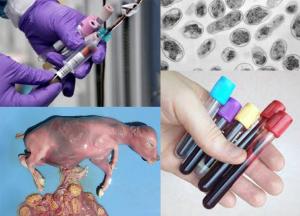Uhunt
ZOONOTIC DISEASES
Uhunt Mag Information
- Posted By : BRISTLE UP
- Posted On : Jun 24, 2019
- Views : 3687
- Category : PIG DOGGING » VET & HEALTH ARTICLES
- Description : "Bella talks about the different diseases that animals can give you and your dogs"
Overview
- By Bella Jaye
There are some diseases which can be passed between multiple species including humans. These are called zoonotic diseases. The diseases relevant to pig hunters are Brucellosis (Brucella Suis strain), Ecoli, Campylobacter Enteritis, Salmonella, Toxoplasmosis, Leptospirosis, Lesteriosis, Q Fever (human vaccination available), Streptococcus, Yersinosis, Tuberculosis, Giardiasis and parasites such as intestinal worms and resulting side effects. I won’t talk about all of these in detail but you can find out more about them on the DPI website or just by general research. Hygiene is the key to protecting yourself against these diseases as you don’t know what kind of infections any pig may be carrying. Don’t stick your hands in your mouth or around soft membranes like eyes or nostrils until they have been washed with hot water and antiseptic soap, use antibacterial hand gels and cover open wounds with waterproof dressings.
Many hunters don’t like wearing gloves, but it is a reasonable step to take in protecting yourself. Keeping yourself regularly de-wormed may sound silly but it’s effective prevention against parasites. Apart from parasites being generally unpleasant to have, Hydatid Disease develops after becoming host to tapeworms so it’s important both you and your dog’s worming treatment covers these particular worms (Sentinel Spectrum or Milbemax for dogs). If you intend on consuming your quarry it’s very important to ensure the meat is cooked thoroughly, this is desirable even if it is being used for dog food only. When gutting an animal do your best to keep all the organs intact to reduce the chances of contaminating meat by spillage, if spillage does occur, it is best to dispose of the carcass and not consume it. Brucellosis can be transmitted between pigs/dogs/people and is therefore the zoonotic disease of most concern to pig hunters and their dogs. It is spread through contact with body fluids from the infected host such as fresh urine, handling aborted fetuses, or from genital fluids during mating between a dog and bitch/sow and boar. Brucellosis affects the reproductive organs causing abortion in females, swelling of testicles in males and infertility in both genders of any species. It may also cause a lack of energy, enlarged lymph nodes and fever.
There is no vaccination available, but treatment with antibiotics is available with limited success for both dogs and people, however many vets will recommend euthanasia for canines. De-sexing any non-breeding dogs and getting breeding animals tested 12 monthly can greatly assist in reducing the risk of transmission, as well as having any symptoms examined as soon as they arise. It is important to assess every pig caught for signs of the disease to determine the risk of each individual, remove your dogs immediately from any quarry and don’t handle any carcasses you believe may carry it. It is a good idea to report any suspected cases of Brucellosis to the DPI or similar organisation for your area (as it is a notifiable disease), and get the dogs who were on that particular hunt quarantined and tested. It has been suggested that de-sexing any entire dogs after exposure to the disease can assist tackling infection but evidence of this is limited because the infection is not contained to sexual organs, and many vets would likely not be willing to try. Testing for dogs is done by a vet, and involves taking a blood sample.
If you tell the vet there is reason to suspect the dog was exposed to an infected pig (you can say something along the lines of it caught a boar who’s testes looked excessively swollen) and they are required to do the testing for free. Don’t get this mixed up though, as the vet still has the right to charge a consultation fee and any consumables. This charge is still a lot cheaper than the cost if you say you want the dog tested ’just because’. A positive test result still doesn’t mean the dog has Brucellosis, it simply means it has been exposed to it in the past and that the body has developed antibodies against the disease. Being vigilant about disease signs, getting any symptoms seen to by a vet and enforcing preventative measurements are the best steps you can take in regards to you and your hound’s health, and watching out for yourself is just as important.
